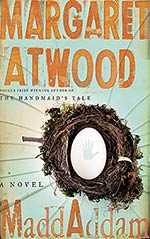
![]() Sable Aradia
Sable Aradia
12/30/2016
![]()
Read for the Apocalypse Now! Reading Challenge, the Women of Genre Fiction Reading Challenge and the Second Best Reading Challenge.
Method of the world's destruction: ecological devastation, corporate greed, and a mad scientist's bioengineered supervirus.
This book was my last hurrah for 2016; I'm not going to manage to finish any more before the year rings out. It was a great way to top it off. MaddAddam is the conclusion of legendary Canadian writer Margaret Atwood's MaddAddam Trilogy. (Reviews of Oryx and Crake and The Year of the Flood can be found at the above links.)
The story of MaddAddam carries on where The Year of the Flood leaves off, with some flashbacks into the past through the eyes of Zeb, who was introduced in the previous novel. Yet, again, you really could read this book entirely on its own, without reading the other two (though I don't recommend it; you won't be as invested in the fates of the characters if you do that).
We return through much of the book to the viewpoint of Toby, one of the protagonists of YoTF, and we are, again, offered a new protagonist in the form of one of the quasi-human genetically engineered Children of Crake, a boy named Blackbeard (it was part of Crake's sense of humour to name them all after significant figures from human history). The story through his eyes is fascinating, because it casts an impartial alien perspective on us and the events of the story, though some didn't enjoy it. Meh; personal tastes, I guess. The story of Ren, the other protagonist of YoTF, continues, and we catch up again with Jimmy, the protagonist of Oryx and Crake.
This is the story of what the survivors do after the Apocalypse, with some flashbacks through the eyes of Zeb that fill in a lot of the blanks about what, exactly, happened.
As I'm prone to do when I do reviews, I read through some of the other reviews on the book that have appeared on Goodreads. I think other people were confused by much of what happened in this novel, because they criticized a lot of things that did not need criticizing. They just missed it, is all. I wonder if this is because the general public does not read a lot of science fiction? Because, for me, it was as clear as if someone had painted it on a wall like a mural.
A reviewer named Jen said the following in her mostly-negative three-star review:
"Not to mention the detail someone else here already mentioned-- come on. ALL of the characters knew each other in former lives? And they just so happen to be among the couple dozen humans who survived the plague? WHAT A COINCIDENCE."
Except it wasn't a coincidence. See, the thing that they all had in common was Crake. Six degrees of separation. And Crake chose these people to be the survivors. I love that she didn't spell this out for us and let us put it together on our own! I'm glad she respects our intelligence!
Jen dislikes this novel for a lot of the reasons that I like it. I like that Toby is shown to have insecurities and fears that are normal for an older woman, even though she's tough as nails (don't worry; you're still young, you'll find out in time.) Even so, Toby chided herself for being silly the whole time, so it's not like she acted on any of those doubts and feelings. And who wouldn't be terrified of being alone in such a world? If you're not, you haven't thought about it hard enough, regardless of your gender.
She dislikes how Atwood handled the resumed story of Jimmy.
The characters changed in the course of this book from who they were in the earlier ones, which is what dynamic characters are supposed to do. Nobody is all one thing. I adored it.
As to disliking some of the odder details, which I won't reveal because I've said too much already...well, I guess that's personal preference. Science fiction fans are going to recognize the much deeper implications and themes that Atwood covers, and they're going to love it. If some of it seems a bit silly to you, don't forget that this is also a satire. It's supposed to be.
Some complex themes were covered too; such as, can human nature truly change, or are we going to keep making the same stupid mistakes forever? How are religions founded and how do they change when exposed to circumstances that challenge their (usually initially very high) ideals? And what do you do with people who insist on harming others to benefit themselves?
As others have pointed out (and this one I agree with) this is not your typical high-action apocalypse story. There's little action, aside from the flashbacks, and since you know that Zeb survives those experiences, they just don't have the same impact. It ends in the way of a good apocalypse yarn; some people live, some die, and nothing will ever be the same again, but life will continue. It was a bit of a tear-jerker too.
And I can forgive Atwood now, because she finally admitted that this might just be science fiction. So.
This "trilogy" is a bit like Lord of the Rings in that it is really intended to be a single book of many pages; so read it that way and you'll enjoy it more. Glad to have discovered Margaret Atwood; really glad to have read this; and glad I did all three books in one year. I think MaddAddam is destined to be one of the great classics of apocalyptica. Highly recommended!
http://dianemorrison.wordpress.com